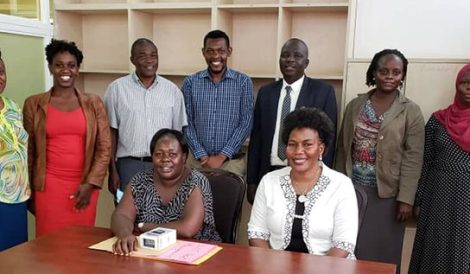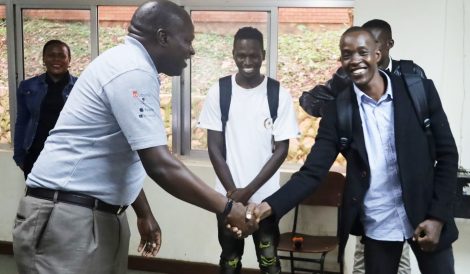Dr. Kanagwa Benjamin and students from the Department of software engineering have designed a Mobile application code-named Boldungu to make primary school pupils enjoy and improve their performance in Mathematics by themselves using a mobile phone.
The tool helps learners practice mathematics by providing a collection of questions, answers, and explanations of concepts and methods. The goal is to build confidence, and excellence in Mathematics and unlock dreams.
This technology was unveiled by the software engineering students Nakimbugwe Ruth Lucky and Masaba Shamsa during the exhibitions organized by the College of Computing and Information Sciences on the theme, “The Future of Computing and Information Sciences/service”, held on 30th September 2022.

“The name Boldungu is a combination of two words; – Bold and Adungu. Adungu is a traditional instrument played for entertainment, dance, and fun, so is the name Boldungu app designed to motivate and create fun in learning mathematics”, said Nakimbugwe
Besides promoting enjoyment and enthusiasm for learning through practical activity, exploration, and discussion, Boldungu is a resource for parents to keep their children productively engaged while at home with good use of digital appliances. It also provides remote tracking of learners’ activities and progress.
Slow learners can practice at their time and pace, hence boosting their self-esteem thereby improving their scores at the end of the cycle assessment. In addition, learners can practice any number of questions that leads to content mastery.
“It is a mathematical app that allows pupils from primary one to three to interact creatively with math in a fun way by providing questions on various topics they are covering in various classes.
They will go to a quiz and select a topic they are comfortable with and it will automatically generate the questions for them. They are able to attempt the questions and a score is provided at the end”, said Masaba Shamsa.

The content she said, is specific to the national curriculum of the selected countries. Unlike traditional textbooks, learners choose and have as many questions as possible for practice.
The random fresh questions in groups of 10 make up a quiz and this provides a short but challenging practice session. Questions come as multiple choice, drag and drop and free text including beautiful graphics.
Each question attempted is a chance to revise the answers and alternative methods. Each answer is linked to learning areas where further reading or practice questions can be selected.
The app has a performance board – a simple scorecard that shows the questions attempted and improvement trends with a five-star rating which gives a quick graphical view to allow one to choose the focus.
Pupils earn badges, certificates, and virtual gifts when they excel in particular topics subtopics, or question formats
Why use Boldungu?
The App provides 100% syllabus coverage based on the national curriculum as approved by the NCDC and is a supplementary teacher resource to cater for deficits in knowledge competency and infrastructure.

Boldungu is a digital platform which enables children, parents and guardians across the world to revise and practice mathematics. The platform uses advanced Artificial Intelligence (AI) and computer algorithms to create age specific quiz cycles grouped by by themes, topics and sub topics. The team at Boldungu believes that mathematics can be made easy for everyone, and better at a younger age. Children are under the parents account which allows parents to closely support their children. Quizes are created by Boldungu Automated Examiner (BAE) and marked by the Boldungu Automated Teacher (BAT) both online and offline when using mobile devices.
It provides a refined diagnostic analysis of the learner’s strength and awareness based on specific topics and activity types.
It improves performance in Mathematics as a subject at the end of the assessment cycle and also reduces administrative costs especially in printing out homework handouts hence time for teachers can be used for more content development.
By: Jane Anyango,
Principal Communication Officer, CoCIS



